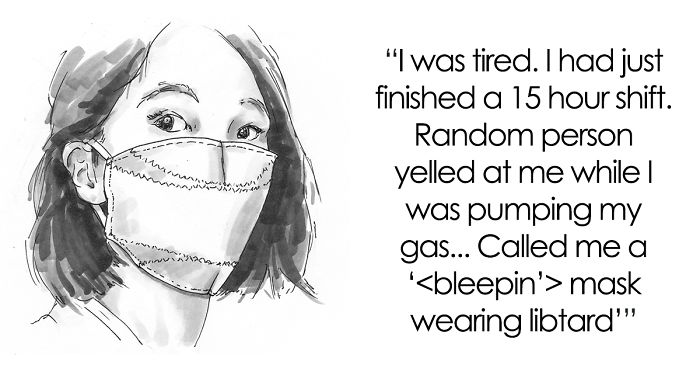
Random Person Yells At A Mask-Wearing Nurse After Her 15-Hour Shift, She Pens The ‘Perfect’ Response
If you think that 2020 is stressful for you, imagine working long shifts as a healthcare professional during the coronavirus crisis, only to have some random person shame and insult you for wearing a mask. In the middle of a pandemic. That’s bound to get your blood boiling, isn’t it?
Imgur user Toulouselachat was yelled at while she was at a gas station for being a “bleepin’ mask-wearing libtard” and penned a comeback online. Her post got more than 4.1k upvotes on the image sharing site and the support of plenty of internet users. The nurse sees wearing masks as a health issue, not a political one, and wants others to think the same way.
Bored Panda reached out to Dr. Peter Chin-Hong, an infectious disease specialist at the University of California, San Francisco, to talk about why some Americans don’t wear face masks, what can be done on a national level to convince them to change their minds, and how this is a medical (not a political) issue. “The virus doesn’t care how you vote—it just wants to get in your nose or mouth!” Scroll down for our full chat with the expert, dear Pandas.
A nurse shared how a random person yelled at her at a gas station because she was wearing a face mask
She penned a response after going back home
“It is really a medical and public health issue that has nothing to do with politics”
“Masks have become politicized in the USA, in the same way that other therapeutics like hydroxychloroquine have been. This is parallel to how it is viewed by some political leaders in Brazil as both brands of leaders have emphasized not wearing masks in public and have relentlessly promoted the use of hydroxychloroquine as COVID-19 therapy despite much scientific evidence to the contrary,” Dr. Chin-Hong went into detail.
“Much of the leadership style in these two countries have been famously anti-science and masking falls into line this way. Masks have essentially become a partisan issue in the US with more Republicans favoring not wearing masks, although this is softening. Not wearing masks have been heralded as a personal freedom issue, which is disheartening, since it is really a medical and public health issue that has nothing to do with politics.”
“We need a national, not a regional approach”
We were also interested to find out the infectious disease expert’s take on what can be done to help convince mask-skeptics to change their beliefs. “Ultimately, the scientific literature supports the use of policy with enforcement if we would like more people to wear masks,” he said.
“So far, this has been patchwork in the US with some states having orders and many states without such mandates. We need a national, not a regional approach.”
Appealing to patriotism could change people’s minds
He continued: “Other interventions that have been suggested include appealing to patriotism (like how masking was messaged in the 1918 Spanish flu pandemic in the US), more marketing (public service announcement blitz, more endorsement from celebrities like Lady Gaga and others, branding of masks by fashion houses and sports teams), and community cultural change. In the US, more women than men wear masks and public messaging must also include interventions aimed specifically at men.”
Dr. Chin-Hong added: “Masks are not a political issue. We should continue to think of them as a medical intervention that is safe, scientifically based, and protects our community and ourselves.”
Here’s how people reacted after they read the nurse’s story
Some US states are reopening while others have paused loosening lockdown regulations because of an increase in the number of infections. Meanwhile, states like California now require people to wear face masks or other coverings in most public spaces. This is done to reduce the spread of the coronavirus. However, some people see this as an attempt to control them and infringe on their freedom.
Right now, both the World Health Organization, as well as the Centers for Disease Control and Prevention recommend wearing masks for the general public. If you have a good memory, you’ll remember that both the WHO and the CDC said the exact opposite early on in the pandemic. It’s this flip-flopping that’s in part responsible for there being mixed messages about mask-wearing in the US.
So why did both organizations recommend the public not wear masks before and why did they change their recommendations? According to UC San Francisco epidemiologist George Rutherford, there was a concern that the limited supply of surgical masks and N95 respirators should be saved for healthcare workers. However, he said that “we should have told people to wear cloth masks right off the bat.” However, hindsight is 20/20 and it’s always easy to criticize decisions when looking back on them.
This is common behavior from the MAGA crowd. They have chosen to act like the virus is a leftist hoax designed to make Trump look bad. PEOPLE ARE DYING, but sure, this mask is a political statement.
Truth Monster out here spreading the gospel of dumbfuckery again? It must be a Wednesday.
Load More Replies...Dear Blue Voters Please for love of all things Holy DO NOT vote third party or write in Bernie Sanders because you do not like Biden. Trump voters will go to the polls in droves, and if you want to win, you really have no other choice but to vote for the lesser of two terrible candidates.
I dont get it. How does a nurse wearing a mask at a gas station affect this c**t in ANY WAY? If she *is* a "libtard" (ugh), how does this affect his life in ANY WAY that justifies him HITTING HER CAR WITH HIS FIST? If it were possible for only these oxygen thieves to get the disease and suffer I would be all for it. This has made me so angry!
Sounds like a case of hating blacks is no longer being fashionable. They need a new target. Haters gonna hate...
Load More Replies...Only according to trumpturds are people that are following the rules and use their brains leftist socialist idiots. Because that's what their esteemed leader has told them again and again. And why believe experts and scientists if Don the Con, who knows more than all of these people together, says what they want to hear?
People really need to spend time in a Covid ward. Dealing with relatives who are denying that grandma died of Covid even with her bloody sputum all over the backseat of their car. (Yep. They waited *that* long. B/c it's not a real problem.)... MASK UP OR SHUT UP.
My response to being called a sheep (as mentioned in the above comments) would be to start bleating. Rather be a sheep than dead!
Sian Edwards, sounds good. Do resist the temptation to head butt him while bleating. ;)
Load More Replies...The country is being run by know nothings and the sad part of it is, they are proud of their willful ignorance.
I used to think of some people being willfully ignorant but the more I thought about what that meant, the more I realized they were just being stupid.
Load More Replies...She needs to walk slowly towards this type of moron, while clearly stating she is an ICU nurse who works with Covid patients, and he is welcome to remove her mask, but not welcome at her hospital.
Should have said something along the lines of "I'll remember that when you're in ICU and I'm your nurse"
I'd also give an evil smile and say "I hope you like rectal thermometers and enemas"
Load More Replies...And this people is why you need to make masks compulsory like mist countries have.
"libtards" are the best people, usually. It's the MAGA's that give Americans a bad reputation...
There is a fairly high number of liberals who are woo-spreading believers of magic, just so long as it’s their “personal” belief system. These people are just as anti-science as the republicans. There are maybe fewer believers of b******t in that camp, and more people who CLAIM to support science, but the party and the liberal camp isn’t free of it by any means. It looks just as bad.
Load More Replies...I have a friend who is a general practitioner-- most of her patients are older people with underlying conditions (ie, some of the most vulnerable people), so she takes wearing a mask very seriously. She got flipped off for wearing a mask one time.
As a globally ashamed and embarrassed American, it’s terrifying just how many of my country-fellows are f*****g insanely ignorant cultists. From the “legit” religions, to the libertarian/capitalists, to the Republican Party leadership, all the way down to the average fool eager to believe conspiracy theories and reject rational/critical thinking and science. My country is terrifying. Why are these people so hell-bent on destroying society??
How about if she asks him his name, so when he comes into her unit, he doesn't get treatment?
I don't think medical ethics would allow that. Or human ethics, for the most part. But it would be SO satisfying!!
Load More Replies...down the drain… that country is going down the drain… can these moron took their gun and just Killing themself it would do a great benefit for america
I've been alive 48 years in the US and I've never witnessed the hate like this before. My daughter is 17 and I feel so bad she had to go to high school all 4 years of trumps reign. The poor kids grew up in a world full of hate made possible by a president. It's disgusting
Load More Replies...my standby for if anyone confronts me for wearing a mask (no one has yet) is "so it's okay if i come over and cough on you without it, right?"
As far as I know, things like this only happen in the USA. In Europe there are people who do not believe in the usefulness of masks, but no one, as far as I know, has ever dared to insult this way a person who wears them. I do not say that in Europe the general culture is incredibily high, but it is not even at the abysmal level of political partisanship of which I have repeatedly read on these pages, It is delusional.
So not the point anyone was trying to make, but there is so much complaining about "Karens" yet we don't feel the need to term men who do stuff like this?!
It’s just “men”. Men are normally the greatest perpetrators of this kind of behavior (aggression mixed with f*****g insane ignorance). The large number of them (even if not the majority) have basically made my half of the species look like microwaved s**t. F*****g aggressively ignorant man-babies...
Load More Replies...Why is it that I knew, before reading the article, that this could only be in America?
My friend says the same thing. She fights with people for asking her to wear a mask. She listens to all the "the government out to get us" things on utube. She asks why I don't want to go food shopping with her. Hmm I wonder.
I think those ppl calling us Libtards are right concerning they’re refusal to wear a mask. I mean I’m all for it , fingers crossed that they get it & drop dead, it’ll truly be a WIN/WIN situation. I can safely say that I’m very sad Trump hasn’t contracted it, followed by dropping dead, hopefully in public since someone would record it on their cell
That reaction in essence is american stupidity at its finest. It always amazes me how fackin stupid people are. I'm from germany, and here we also have some of those clowns saying it's all just a government hoax and masks are unnecessary. Don't listen to these guys kids, that's what natural selection is there for.
This isn’t natural selection. This is antisocial (socially destructive) and aggressive ignorance.
Load More Replies...Dude was lucky she didn't shoot him. Florida's Stand Your Ground law includes vehicles (by precedent). She was within her rights to shoot him.
I'm sorry, but as soon as that bloke would have touched/hit my car, it would have gone down. He wouldn't have had time to spew all that. Do not mess with my stuff!!! Or me ;)
Let's think about this rationally, I personally do not wear a mask for reasons that are irrelevant, but why would I get upset if someone else is, think, think, these posts are only designed to upset you, I can prove it simply, what upsets you more someone wearing a mask or not wearing a mask, because of your own answer to this question, the truth is, many more people are being shamed for Not wearing a mask than for wearing one
ah yes... this is why the USA is now ranked 27th in the world for both education and healthcare..... :(
This is what happens when you inbreed - stupid f8888 people. Hope they all get sick + pass away. (preferably before Nov. 3rd.)
Respect to the one wearing the mask who spent her time learning how to be a nurse or doctor so she could help. I would stand by her with dignity. The male person (man?) afraid to admit there is a virus or that the woman he yelled at is so much more than him I would try not to stoup to his level and punch him in the nose.
Personally, I don't give two farts and a s**t about what "celebrities" think or do. I CAN NOT wear a mask because of copd and a spell of coccidiomycosis.
Stay home. If you have to go out, take a walking stick or one of those larger umbrellas with you to keep people away from you so you don't get sick. It looks like things are only going to get worse--for all of us.
Load More Replies...This is common behavior from the MAGA crowd. They have chosen to act like the virus is a leftist hoax designed to make Trump look bad. PEOPLE ARE DYING, but sure, this mask is a political statement.
Truth Monster out here spreading the gospel of dumbfuckery again? It must be a Wednesday.
Load More Replies...Dear Blue Voters Please for love of all things Holy DO NOT vote third party or write in Bernie Sanders because you do not like Biden. Trump voters will go to the polls in droves, and if you want to win, you really have no other choice but to vote for the lesser of two terrible candidates.
I dont get it. How does a nurse wearing a mask at a gas station affect this c**t in ANY WAY? If she *is* a "libtard" (ugh), how does this affect his life in ANY WAY that justifies him HITTING HER CAR WITH HIS FIST? If it were possible for only these oxygen thieves to get the disease and suffer I would be all for it. This has made me so angry!
Sounds like a case of hating blacks is no longer being fashionable. They need a new target. Haters gonna hate...
Load More Replies...Only according to trumpturds are people that are following the rules and use their brains leftist socialist idiots. Because that's what their esteemed leader has told them again and again. And why believe experts and scientists if Don the Con, who knows more than all of these people together, says what they want to hear?
People really need to spend time in a Covid ward. Dealing with relatives who are denying that grandma died of Covid even with her bloody sputum all over the backseat of their car. (Yep. They waited *that* long. B/c it's not a real problem.)... MASK UP OR SHUT UP.
My response to being called a sheep (as mentioned in the above comments) would be to start bleating. Rather be a sheep than dead!
Sian Edwards, sounds good. Do resist the temptation to head butt him while bleating. ;)
Load More Replies...The country is being run by know nothings and the sad part of it is, they are proud of their willful ignorance.
I used to think of some people being willfully ignorant but the more I thought about what that meant, the more I realized they were just being stupid.
Load More Replies...She needs to walk slowly towards this type of moron, while clearly stating she is an ICU nurse who works with Covid patients, and he is welcome to remove her mask, but not welcome at her hospital.
Should have said something along the lines of "I'll remember that when you're in ICU and I'm your nurse"
I'd also give an evil smile and say "I hope you like rectal thermometers and enemas"
Load More Replies...And this people is why you need to make masks compulsory like mist countries have.
"libtards" are the best people, usually. It's the MAGA's that give Americans a bad reputation...
There is a fairly high number of liberals who are woo-spreading believers of magic, just so long as it’s their “personal” belief system. These people are just as anti-science as the republicans. There are maybe fewer believers of b******t in that camp, and more people who CLAIM to support science, but the party and the liberal camp isn’t free of it by any means. It looks just as bad.
Load More Replies...I have a friend who is a general practitioner-- most of her patients are older people with underlying conditions (ie, some of the most vulnerable people), so she takes wearing a mask very seriously. She got flipped off for wearing a mask one time.
As a globally ashamed and embarrassed American, it’s terrifying just how many of my country-fellows are f*****g insanely ignorant cultists. From the “legit” religions, to the libertarian/capitalists, to the Republican Party leadership, all the way down to the average fool eager to believe conspiracy theories and reject rational/critical thinking and science. My country is terrifying. Why are these people so hell-bent on destroying society??
How about if she asks him his name, so when he comes into her unit, he doesn't get treatment?
I don't think medical ethics would allow that. Or human ethics, for the most part. But it would be SO satisfying!!
Load More Replies...down the drain… that country is going down the drain… can these moron took their gun and just Killing themself it would do a great benefit for america
I've been alive 48 years in the US and I've never witnessed the hate like this before. My daughter is 17 and I feel so bad she had to go to high school all 4 years of trumps reign. The poor kids grew up in a world full of hate made possible by a president. It's disgusting
Load More Replies...my standby for if anyone confronts me for wearing a mask (no one has yet) is "so it's okay if i come over and cough on you without it, right?"
As far as I know, things like this only happen in the USA. In Europe there are people who do not believe in the usefulness of masks, but no one, as far as I know, has ever dared to insult this way a person who wears them. I do not say that in Europe the general culture is incredibily high, but it is not even at the abysmal level of political partisanship of which I have repeatedly read on these pages, It is delusional.
So not the point anyone was trying to make, but there is so much complaining about "Karens" yet we don't feel the need to term men who do stuff like this?!
It’s just “men”. Men are normally the greatest perpetrators of this kind of behavior (aggression mixed with f*****g insane ignorance). The large number of them (even if not the majority) have basically made my half of the species look like microwaved s**t. F*****g aggressively ignorant man-babies...
Load More Replies...Why is it that I knew, before reading the article, that this could only be in America?
My friend says the same thing. She fights with people for asking her to wear a mask. She listens to all the "the government out to get us" things on utube. She asks why I don't want to go food shopping with her. Hmm I wonder.
I think those ppl calling us Libtards are right concerning they’re refusal to wear a mask. I mean I’m all for it , fingers crossed that they get it & drop dead, it’ll truly be a WIN/WIN situation. I can safely say that I’m very sad Trump hasn’t contracted it, followed by dropping dead, hopefully in public since someone would record it on their cell
That reaction in essence is american stupidity at its finest. It always amazes me how fackin stupid people are. I'm from germany, and here we also have some of those clowns saying it's all just a government hoax and masks are unnecessary. Don't listen to these guys kids, that's what natural selection is there for.
This isn’t natural selection. This is antisocial (socially destructive) and aggressive ignorance.
Load More Replies...Dude was lucky she didn't shoot him. Florida's Stand Your Ground law includes vehicles (by precedent). She was within her rights to shoot him.
I'm sorry, but as soon as that bloke would have touched/hit my car, it would have gone down. He wouldn't have had time to spew all that. Do not mess with my stuff!!! Or me ;)
Let's think about this rationally, I personally do not wear a mask for reasons that are irrelevant, but why would I get upset if someone else is, think, think, these posts are only designed to upset you, I can prove it simply, what upsets you more someone wearing a mask or not wearing a mask, because of your own answer to this question, the truth is, many more people are being shamed for Not wearing a mask than for wearing one
ah yes... this is why the USA is now ranked 27th in the world for both education and healthcare..... :(
This is what happens when you inbreed - stupid f8888 people. Hope they all get sick + pass away. (preferably before Nov. 3rd.)
Respect to the one wearing the mask who spent her time learning how to be a nurse or doctor so she could help. I would stand by her with dignity. The male person (man?) afraid to admit there is a virus or that the woman he yelled at is so much more than him I would try not to stoup to his level and punch him in the nose.
Personally, I don't give two farts and a s**t about what "celebrities" think or do. I CAN NOT wear a mask because of copd and a spell of coccidiomycosis.
Stay home. If you have to go out, take a walking stick or one of those larger umbrellas with you to keep people away from you so you don't get sick. It looks like things are only going to get worse--for all of us.
Load More Replies...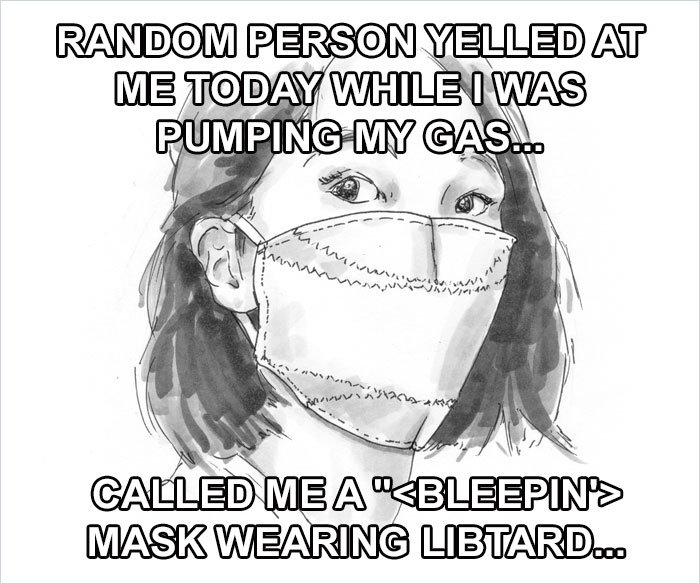

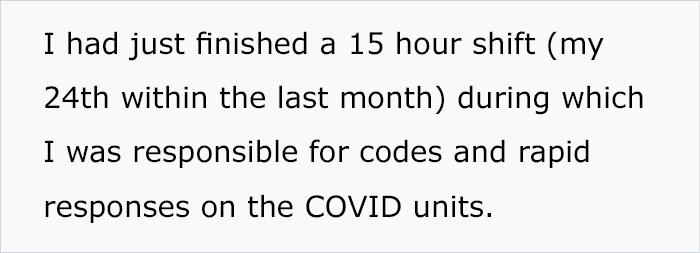
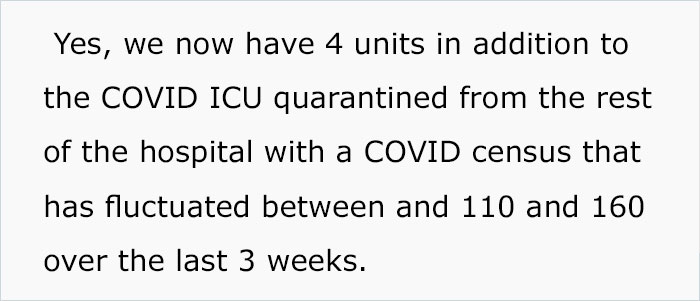
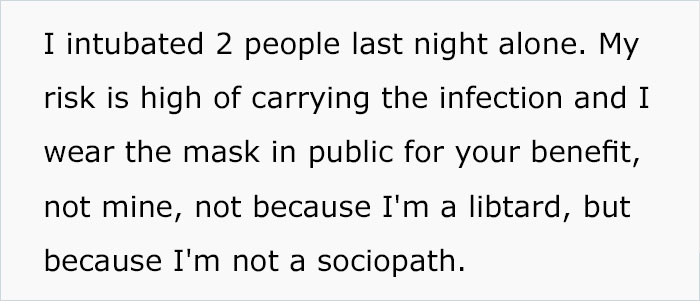
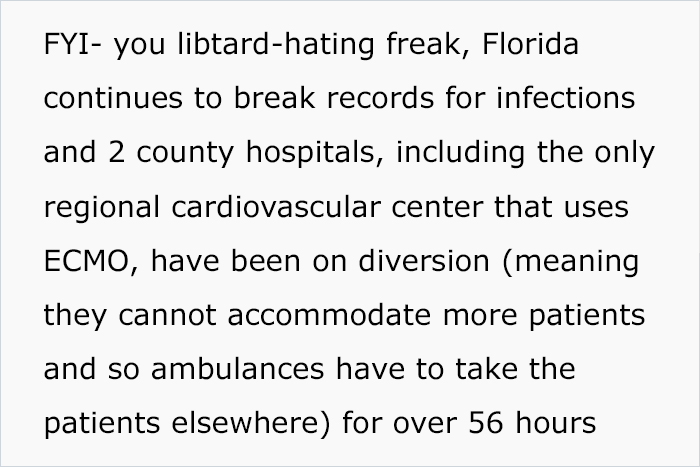



















161
97